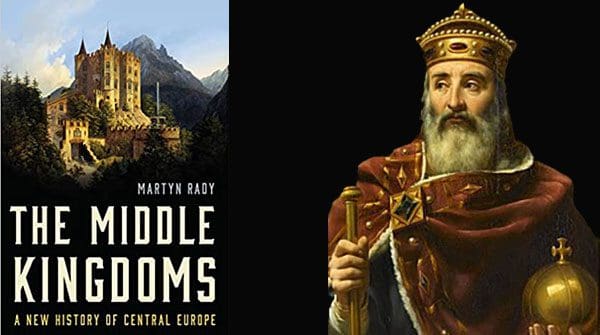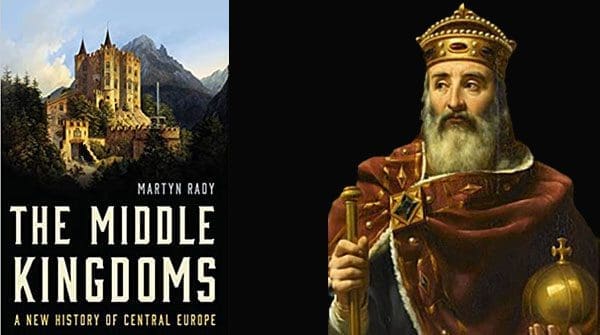But who was Charlemagne and why is a prize named after him?
 Zolodymyr Zelenskyy and the Ukrainian people were recently awarded 2023’s Charlemagne Prize. Inaugurated in 1950, it’s a prestigious recognition that’s previously gone to the likes of Henry Kissinger, Vaclav Havel, Tony Blair, Bill Clinton, Angela Merkel and Pope Francis. This is high-grade stuff,
Zolodymyr Zelenskyy and the Ukrainian people were recently awarded 2023’s Charlemagne Prize. Inaugurated in 1950, it’s a prestigious recognition that’s previously gone to the likes of Henry Kissinger, Vaclav Havel, Tony Blair, Bill Clinton, Angela Merkel and Pope Francis. This is high-grade stuff,
The historical personage after whom the award is named died in 814, but his reputation has persisted down the centuries. Napoleon, for instance, was a great admirer. Today, Charlemagne is often referred to as the “father of Europe” and a symbol of the value inherent in European unification.
But who was Charlemagne really? And does he actually merit the hype?
I must confess that I once thought of him as French. After all, he was King of the Franks and is much admired by modern French leaders. That, however, is way too simple a perspective.
 |
| Related Stories |
| Marie Antoinette’s formidable mother
|
| The legend of King Arthur is a gift that keeps on giving
|
| The last children of Anglo-Saxon England
|
The Franks were originally a Germanic tribe that lived along the Rhine, pursuing their business on both sides of the Roman imperial frontier. Their first known king, Childeric, lived in the fifth century and apparently functioned as both a tribal leader and a Roman administrator. His grave at Tournai, in modern Belgium, was discovered in 1653 and yielded spectacular contents consistent with a man of importance and wealth.
But working relations with the Romans notwithstanding, the Franks were prepared to step in and take what they could when the empire collapsed. And along the way, they converted to Catholicism – thanks to Childeric’s son Clovis – and took over most of what had been the Roman province of Gaul (think modern France).
Charlemagne himself was born in the 740s, most likely in what is now either Belgium or Germany. When his father, Pippin, died in 768, the kingdom of the Franks was divided between his two sons. Although this was in keeping with Frankish tradition, it was also a source of tension and potential conflict. Conveniently for Charlemagne, his brother died in 771, and the problem was thus resolved.
First and foremost, Charlemagne was a warrior king. This observation isn’t meant as a rebuke. Kings of the time were expected to be warriors. And if they weren’t, there might be unwelcome consequences.
Charlemagne, though, was extraordinarily good at it. Over the course of some 30 years, he doubled the size of the Frankish kingdom, extending it to incorporate not just modern France but also most of Western Europe, including Northern Italy. Then on Christmas Day 800, Pope Leo III crowned him in St. Peter’s as Emperor of the Romans. Picking Christmas Day was a savvy meld of Church and Crown – William the Conqueror did the same in England in 1066.
In his new book The Middle Kingdoms, historian Martyn Rady describes Charlemagne as being almost continually at war. Reaching beyond the traditional Frankish lands in Germany, he took conquering aim at Saxony and Bavaria. And he could be particularly ruthless. Perhaps the most famous – or notorious – incidence occurred in 782 when, to punish a rebellion, Charlemagne reputedly had 4,500 Saxon men beheaded in a single day.
As a consequence of this eastward expansion, Charlemagne’s world became even more German. In Rady’s assessment, “the weight of the Frankish kingdom shifted from the interior of what is modern-day France towards the Rhine and the Moselle, where Charlemagne had his greatest palaces.” His personal favourite was in Aachen, now Germany’s westernmost city.
But there was more to Charlemagne than exceptional military prowess. Although personally illiterate, he surrounded himself with people who could read and write and was fond of having books read aloud to him. He also had a talent for organization and an appreciation of the utility of scholars and scholarship. One of his court intellectuals – the Anglo-Saxon cleric Alcuin of York – rhapsodized about a “New Athens” (shades of the intellectual sycophancy later associated with John F. Kennedy’s Camelot).
After his 814 death, Charlemagne was interred in Aachen Cathedral, one of Europe’s oldest and the building of which he had sponsored. His family dynasty, however, didn’t last long. Rady puts it this way: “Charlemagne’s line withered. What had once been a thriving enterprise with too many sons faltered in the last decades of the ninth century on account of childlessness and premature deaths.”
But his reputation – or maybe we should say his legend – persisted across the centuries, inspiring all sorts of people to seek to emulate him. Charlemagne’s historical appeal to those ideologically invested in European unification is understandable. Still, we can enjoy an irreverent chuckle at the thought of self-assertive “idealism” associated with the memory of an unabashed man of conquest.
Troy Media columnist Pat Murphy casts a history buff’s eye at the goings-on in our world. Never cynical – well, perhaps a little bit.
For interview requests, click here.
The opinions expressed by our columnists and contributors are theirs alone and do not inherently or expressly reflect the views of our publication.
© Troy Media
Troy Media is an editorial content provider to media outlets and its own hosted community news outlets across Canada.

